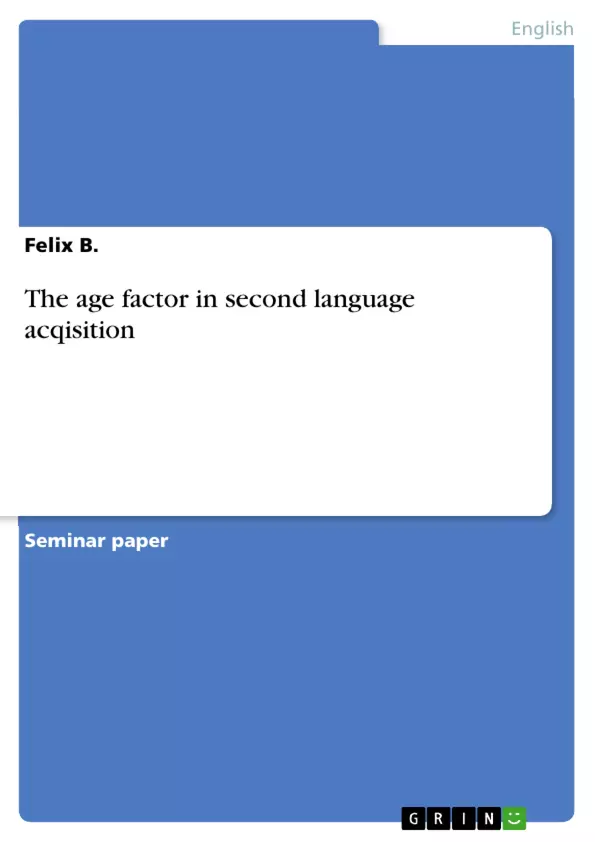Human beings have the capacity to acquire not only a mother tongue, but also second or third languages. Consequently it is not unusual that we find much more bilingual and multilingual individuals than monolingual in our world today. Broad levels of population deal with different languages in addition to their mother tongue and this knowledge is more and more seen as normal in nearly every area of life. The potential for acquiring second languages seems to last throughout one’s lifetime but depends on many variables. According to Muriel Saville-Troike individual learners acquire second languages differently in consequence of influencing factors like age, sex, aptitude, motivation, cognitive style, personality or learning strategies. Age as an effective factor in second language acquisition is thereby one of the most controversy variables and recurring themes. The question of whether, and how, age affects this acquiring process has been a major issue in second language research since its establishment.
This paper should examine the relationship of the age to second language acquisition. Therefore a number of several studies provide different point of views and some of them will be specified in this paper. The structure is based on the book ‘Language Acquisition: The Age Factor’ by David Singleton and Lisa Ryan (2004) which was also used as main source.
In conclusion a critical review on the several positions will be carried out to see whether there is an optimal age to start acquiring a second language or not and whether a critical period hypothesis in second language acquisition exists or not.
Inhaltsverzeichnis (Table of Contents)
- Introduction
- The Age Factor in Second Language Acquisition
- The Critical Period Hypothesis
- Evidence for and against the CPH in Second Language Acquisition
- The 'Younger = Better' Position
- The 'Older = Better' Position
- The 'Younger = Better in Some Respects' Position
- The 'Younger = Better in the Long Run' Position
- Conclusion
Zielsetzung und Themenschwerpunkte (Objectives and Key Themes)
This paper explores the relationship between age and second language acquisition. It examines the various positions on this topic, including the "younger = better," "older = better," "younger = better in some respects," and "younger = better in the long run" perspectives. The paper focuses on the critical period hypothesis and its application to second language acquisition. It analyzes evidence for and against this hypothesis, drawing upon studies and research findings in the field.- The age factor in second language acquisition
- The critical period hypothesis
- Evidence supporting the "younger = better" position
- Evidence challenging the critical period hypothesis
- The role of brain plasticity in language acquisition
Zusammenfassung der Kapitel (Chapter Summaries)
- Introduction: This chapter introduces the topic of second language acquisition and highlights the importance of age as a factor. It establishes the research question of whether there is an optimal age for acquiring a second language and whether a critical period hypothesis exists.
- The Age Factor in Second Language Acquisition: This chapter examines the different perspectives on the role of age in second language acquisition. It presents four main positions: the "younger = better" position, the "older = better" position, the "younger = better in some respects" position, and the "younger = better in the long run" position.
- The Critical Period Hypothesis: This chapter delves into the critical period hypothesis, a central concept in language acquisition research. It explores Lenneberg's theory and its application to second language acquisition. The chapter also examines evidence from studies involving feral children, deaf children, and other populations.
- Evidence for and against the CPH in Second Language Acquisition: This chapter presents specific studies and research findings that provide evidence for and against the critical period hypothesis. It focuses on the "younger = better" position and the "older = better" position, examining studies that support these perspectives.
Schlüsselwörter (Keywords)
The primary focus of this paper is on the age factor in second language acquisition. The key terms and concepts include critical period hypothesis, sensitive period, brain plasticity, second language acquisition, age of onset, and phonological development. The paper also explores research methods such as experimental research and studies involving immigrant populations.Frequently Asked Questions
What is the Critical Period Hypothesis (CPH) in language acquisition?
The CPH suggests there is a specific window of time in human development during which languages can be acquired most easily. After this period, acquiring a second language becomes more difficult.
Is "younger always better" when learning a second language?
The paper examines different positions, including "younger = better" and "older = better." While younger learners often achieve higher long-term proficiency, older learners may be more efficient in some cognitive aspects of learning.
What role does brain plasticity play in second language acquisition?
Brain plasticity refers to the brain's ability to change and adapt. It is a key factor in the discussion of the critical period, as it is believed to decrease with age, affecting language learning capabilities.
What evidence is used to test the Critical Period Hypothesis?
Researchers often study feral children, deaf children, and immigrant populations to see how the age of first exposure to a language affects ultimate fluency.
Can adults still achieve native-like fluency in a second language?
While the potential for acquiring a second language lasts throughout a lifetime, achieving native-like phonological development (accent) is often more challenging for those who start as adults.
- Arbeit zitieren
- Felix B. (Autor:in), 2010, The age factor in second language acqisition, München, GRIN Verlag, https://www.grin.com/document/282584



